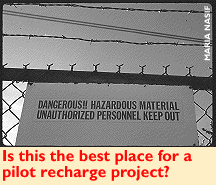If the city of Tucson decides to proceed with this recharge project without properly investigating potental environmental hazards, it could cost taxpayers a bundle. Already more than a half-million dollars has been spent in land and development costs.
The Pima Mine Road Pilot Recharge Project is being developed under an intergovernmental agreement between the City of Tucson and the Central Arizona Water Conservation District (CAWCD). Records show CAWCD officials awarded the project's $500,000 consulting contract to the firm of CH2M Hill.
CAWCD usually adheres to a strict bidding policy, said Jim McIntyre, the organization's public relations officer. He added, "This was the first time we ever deviated from the policy. The situation was unique."
 Unique apparently because of the sense of urgency surrounding
the awarding of the contract. Minutes of CAWCD's October 5 board
meeting indicate the board members were feeling pressured by Pima
County's development of its own recharge project. Why the board
would feel pressured was not entirely clear from the minutes,
and CAWCD officials were not able to explain their board's sense
of urgency. But according to the minutes, two Tucson members of
the CAWCD board, Marybeth Carlile and former Tucson Water Director
Frank Brooks, "encouraged" the board to award the contract
to CH2M Hill "without further delay."
Unique apparently because of the sense of urgency surrounding
the awarding of the contract. Minutes of CAWCD's October 5 board
meeting indicate the board members were feeling pressured by Pima
County's development of its own recharge project. Why the board
would feel pressured was not entirely clear from the minutes,
and CAWCD officials were not able to explain their board's sense
of urgency. But according to the minutes, two Tucson members of
the CAWCD board, Marybeth Carlile and former Tucson Water Director
Frank Brooks, "encouraged" the board to award the contract
to CH2M Hill "without further delay."
Several former Tucson Water employees are now employed by CH2M Hill, including Tucson Water's most recent former director, Mike Tubbs. Contacted by The Weekly, Tubbs said he works in "business development" for Operations Management International, a companion company of CH2M Hill.
McIntyre also said CAWCD administrative rules require competitive bidding for all contracts of $5,000 or more, with the exception of contracts "for service of a professional, artistic, scientific or technical character."
As a matter of policy, the City of Tucson also exempts architects and engineers from the formal bidding process. In other words, when city staff selects an architect or an engineer, they're not obliged to select the low bidder.
The CAWCD's urgent decision to move forward with the Pima Mind Road Recharge Project has caught the attention of Tucson City Councilman Steve Leal, who, during the November 20 council meeting, raised some concerns about the project. Among them is the fact the project would be located in an area surrounded on three sides by major groundwater users--the mines, pecan growers and the Tohono O'Odham tribe. Leal pointed out recharging the aquifer in this area would only assure those entities of unlimited supplies of groundwater--not a great idea if the city hopes to sell CAP water.
Leal also said it's imperative for each of the areas being considered for recharge projects to undergo rigorous environmental assessments. He said it was "unconscionable" for CAWCD and Tucson Water to be moving ahead with a recharge project without first having conducted a thorough environmental investigation of the area.
However, water officials have apparently shrugged off Leal's concerns.
Mitch Basefsky, Tucson Water's public relations chief, said as far as he knows no investigations or studies are being done as a result of Leal's complaints. Nor is there any reaction from Tucson Water to The Weekly's recent story detailing the potential dangers of locating a recharge project near the abandoned hazardous materials plant.
Basefsky said that any environmental problems would be unearthed during the upcoming permitting process with state environmental agencies. Unfortunately, by that time, the city will have spent more than $1 million on the project.
The lack of environmental investigation lends fuel to the fire of speculation among proponents of Tucson's recently successful recharge initiative that Tucson Water and CAWCD officials may attempt to sabotage recharge through shoddy implementation. They would do so, goes the currently popular theory, in an effort to aid state officials and the Arizona development community fighting to maintain control over Arizona's CAP allotment in order to fuel growth.
"Maybe it's Chinatown out there," said one local conspiracy buff, referring to the 1974 Jack Nicholson movie about allegedly underhanded water grabs in a rapidly growing Los Angeles of the 1930s.





